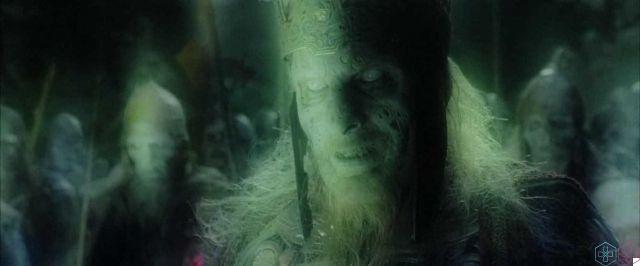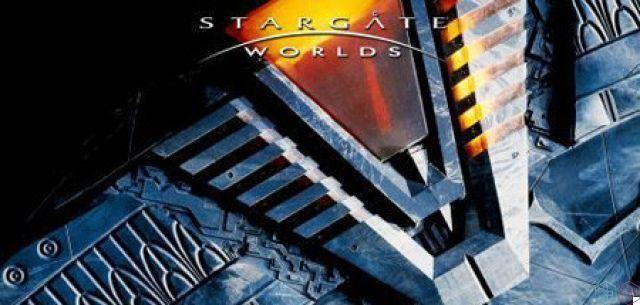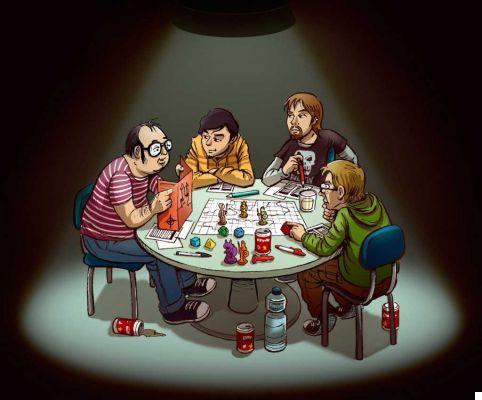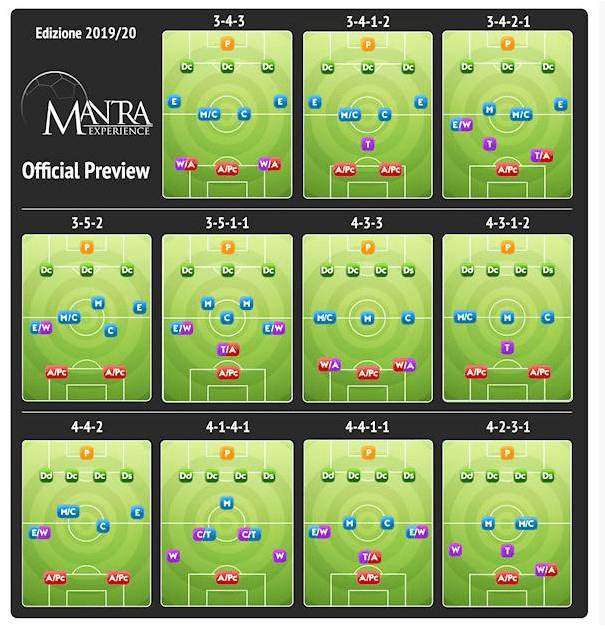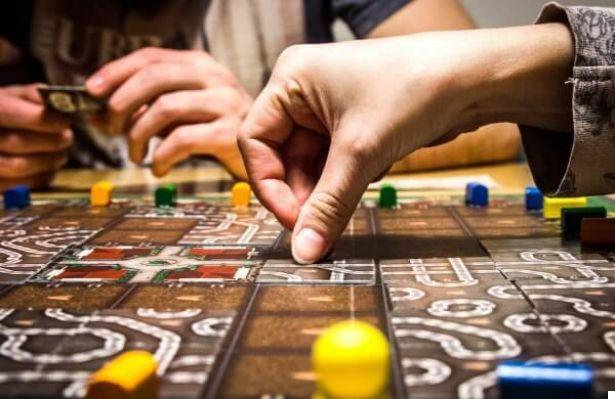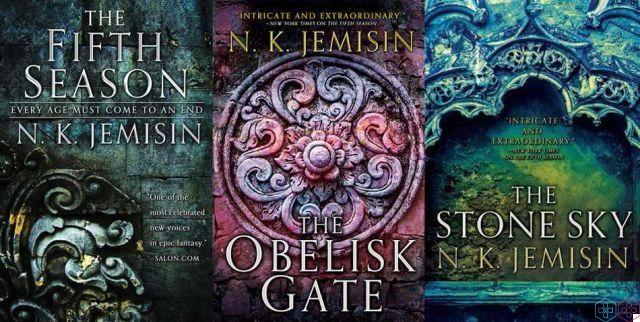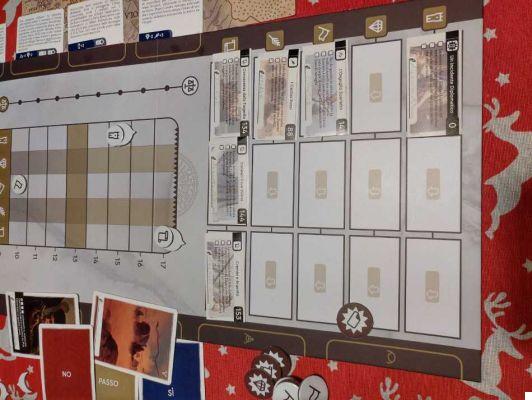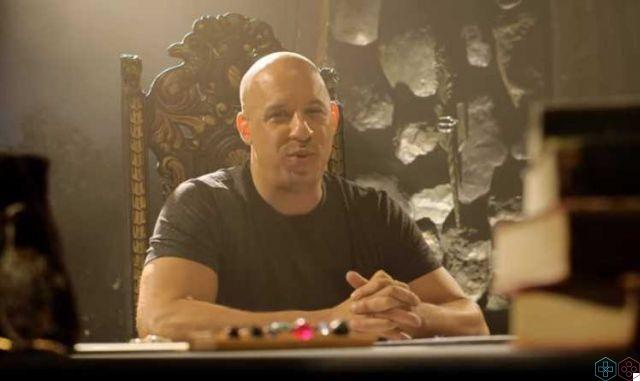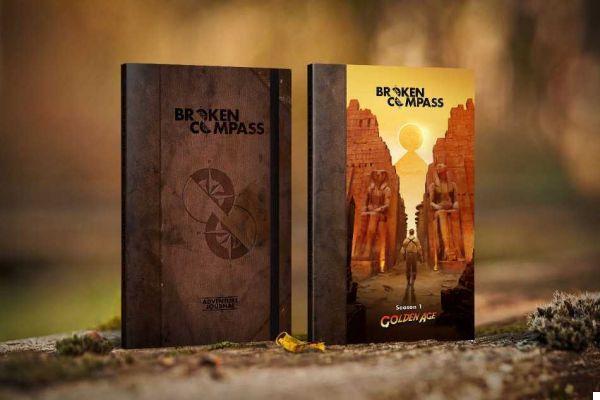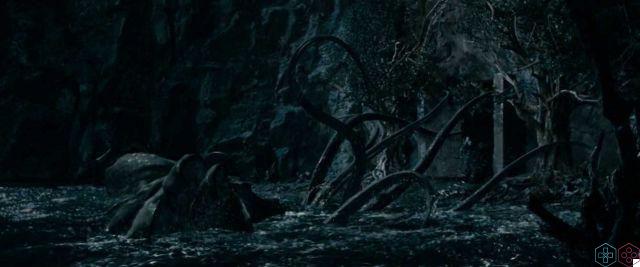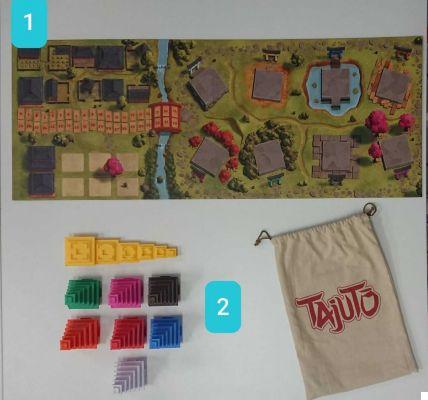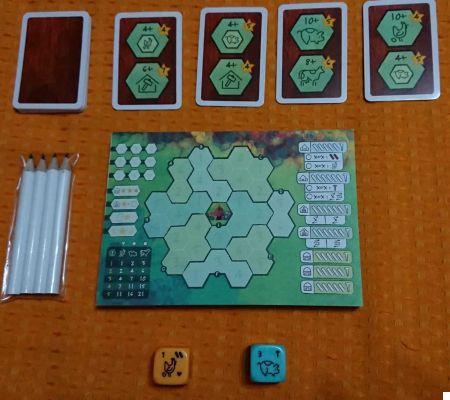A base edition with some flaws but an extraordinarily rare expansion: discover Cyclades, the latest of the dudes on map titles, in our new review
Son of the wise genius of Bruno Cathala (Shadows Over Camelot, Kingdomino, 7 Wonders Duel, etc.), Cyclades has enjoyed classic status for 11 years now; however, it is never too late to tackle the review, especially if it includes every expansion. With Cyclades, we close the trilogy of dudes on a map by the French publisher Matagot. If you missed the first two reviews, retrieve them to get an overview of the wonderful work of this small independent publisher: Kemet, Inis. But now let's focus on the Cyclades review and understand why it's "divine with every expansion".
The road to Olympus is paved with gold | Cyclades Review
The setting is as classic as it is effective: in ancient Greece, the Poleis are at war. To prevail over each other they will fight by land and by sea, relying on the benevolence of the gods; in particular, those who are interested in what is happening in the Cyclades archipelago are (for now) Athena, Ares, Zeus, Poseidon and Apollo. They do not easily grant their favors, rather large offerings of gold will be needed to attract their blessings on us. If we manage to win their favor in crucial moments, we will be able to expand and the one who controls two Poleis at the end of the lap triumphs.
To each divinity an attribute | Cyclades Review
In managing our ambition for conquest and hegemony, we will have to be engaged on several fronts. Our turn begins with what it is the beating heart of the game: the open auction, through which the action that each player will be able to carry out will be decided. The gods are arranged in random order every turn and, although this is irrelevant in the auction phase, at the end of the same it determines the order of play.
The fundamental mechanism, which adds a lot of strategic depth, is theimpossibility of relaunching for the same divinity; in fact, if I bet 3 coins on Athena and an opponent raises to 4, I will not be able to answer him on Athena, but I will have to change divinity, perhaps Ares. I will then be able to return to Athena only if I were to be ousted by Ares. When every player has settled on a deity, it starts to get serious.
Athena and the power of philosophy
Of the many attributes of Athena, that of wisdom is explored in the Cyclades. Winning the action of Athena allows us to form a philosopher: with four philosophers we can immediately build a Polis, or one of the two we need to win. Also, we can build the representative building of Athena, a university (then we'll see what these buildings are for). Divinity only apparently weaker, in the hands of an experienced player Athena gives rise to unexpected and difficult to contest victories.
The supreme Zeus is the master of myth
Typically, in mythological games, Zeus ends up being either a crazy bolt worse than an insect thunderbolt or a terribly unbalanced being who obscures the other gods. Two thumbs up (cit.) To the authors for giving it a coherent and original look at the same time.
In fact, Zeus allows us to manipulate the flow of mythological creatures, monsters available in rotation to players with particular powers; specifically, we can discard one and draw another, allowing us to literally change the cards on the table after the auctions have closed. Another characteristic of the god is to provide us with priests, who allow us to pay the offerings to the gods less than what we have nominally offered. Finally, the building of Zeus is the temple.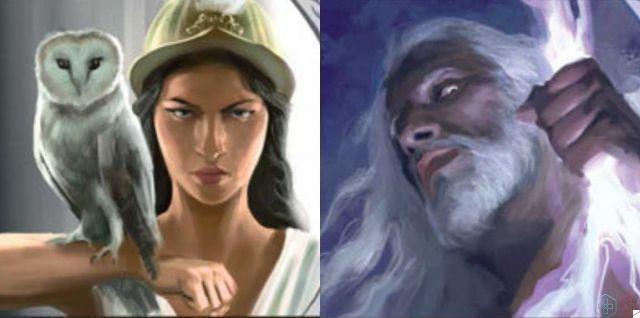
Ares and the carnage in battle
When a player wins Ares, he always gives the others a little scare. In conclusion it is only with the god of war that the islands of others can be conquered. Not that the balance between deities is bad, of course (if you just bet on Ares, you could never win the game), but the prospect of losing an island is never pleasant. Thus Ares allows us to recruit hoplites, to move them across ship decks and, consequently, to do battle. He is the only one in the Cyclades base that allows territorial expansion, but in the course of the review we will find out how the problem was solved. The building that we can build with this god is the barracks.
On the crest of the wave with Poseidon
This deity, to be honest, is more powerful in the base game, as you can only travel by sea in it. On the other hand, let us always remember that we are playing in an archipelago. Poseidon allows us to build and move our fleet; with ships it is possible to occupy merchant routes, but above all to form bridges between islands for ground troops. The building linked to this deity is of course the port.
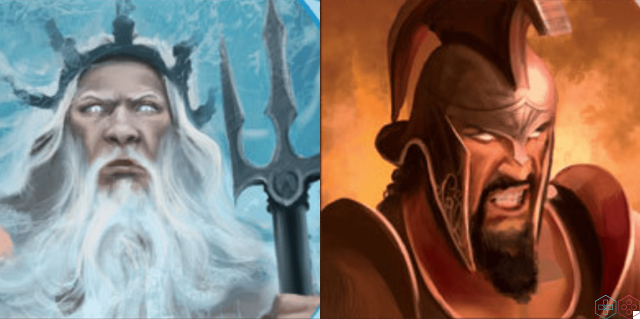
With Apollo, wealth flows
Finally we find Apollo: he is the only god who is always available even in games with less than five players. The divinity of the sun is the only one who does not ask for offerings; on the contrary, it will grant us a cornucopia, in other words a fixed income to be placed on our territory. Choosing Apollo basically means having a mountain of money in the next round, because not only will we not pay the offerings to the gods, not only will we not pay for their shares, but we will also add a gold to our income.
But be careful, you pay for so much abundance in one way or another: by choosing Apollo we will not be able to do anything; we will not be able to build buildings (he is the only god who does not provide one) and we will not be able to hire mythological creatures, not even activate abilities of those already in our possession. We will have to limit ourselves to contemplating the radiant generosity of the god and hope that it does not attract the cravings of the other players.
To a building from victory | Cyclades Review
As mentioned, to win it is necessary to control two Poleis at the end of the game round. However, we start without any Polis at stake: this is because it is up to us to build them. To build one, you have to control four different buildings, one for each deity (even if on distant territories it doesn't matter). If we meet this condition in our turn, we can simply remove them from the board and place a Polis tile in a suitable space. From this moment on, however, I will have to defend it tooth and nail, because in addition to building them, they can be obtained by conquering them.
An overview of the Aegean: what we like about Cyclades
The win mechanism is the other great advantage of Cyclades, along with the auctions, because it allows everyone to really stay in the game until the end. In other words, it is realized an incredible balance between the mechanism of bash the leader and its opposite, kingmaking; if you get an advantage in the Cyclades, you have the chance to keep it, but if you play lightly you run the risk of losing everything in one turn and having another crowned in your place. In short, you have to close with caution, not to make missteps, but also to give yourself a move, or the other players will join you: a masterpiece.
All, we remember, placed in one clean and streamlined shift structure and with a combat system with a modified D6 that limits the risk, while leaving only a slightly spicy aftertaste. In over thirty games, it has never happened that the expected outcome of a battle was overturned: the only real variable is the consistency of the losses.
What are the problems with the base game?
At this point we have taken a look at the base game, in which the merits are already clearly seen, that is auctions and win conditions; what arouses some perplexity instead is the slowness to which the game risks succumbing. If we reflect for a moment, we will realize that a player will be able to move and fight with great difficulty; first by conquering Poseidon, then by conquering Ares and above all he must be able to afford the cost of the operation, so he must have taken turns on Zeus or Apollo. Understandably, an average shift every 3/4 turns legitimizes the criticisms of detractors who deny the basic game of cumbersome; luckily in this review we also discover the added value of each Cyclades expansion.
The solution comes from below | Cyclades review: the Hades expansion
With this first major expansion, you really begin to transform the good that has already been seen with the base game into something exceptional. The god Hades decides to go down (or go up?) On the pitch, but just like death, you never know when it might come. Furthermore, together with him the rest of the Pantheon decides to reveal themselves in the form of secondary divinities.

The bowels of the Earth take over the Aegean Sea
The power of Hades is a panacea to remedy the aforementioned slowness of Cyclades. When he comes into play, in fact, he unites the powers of Ares and Poseidon, at a reduced cost; that is, it supplies us with hoplites and ghost ships, allowing us to move them, and with them our living troops as well. At the end of the turn, they vanish and Hades returns to the shadows, but the conquests remain. On average every 3 turns the god of death makes its appearance and the game moves a lot.
The Pantheon takes sides
An addition that provides additional strategic depth in the auction phase are the secondary deities; we speak of well-known names, such as Artemis, Aphrodite, Demeter, Dionysus, Hephaestus, etc. which from turn to turn are "added" to the last major divinity in turn order. They do not provide actions, but bonuses that can also be very impactful (for example, Aphrodite doubles your troops on one territory, not bad!).
In short, the dogma of being first in order to choose the best mythological creatures is questioned and the game is enriched with strategies and twists.
The Titans shape the Earth itself | Review Cyclades: The Titans Expansion
This second major set embodies the meaning of daring. In a game that is already established and functioning, completely changing the board, managing to keep the positive aspects and smoothing out the few negatives is a masterpiece of game design.
And yet it moves…
If with Hades the movement was still subordinated to ship bridges and therefore cumbersome, Titans sweeps away this criticality, bringing out an entire continent. From now on it is played on the mainland, but it doesn't end there.
Cronus, the new deity, provides us with titans if we get his favor; a titan, while counting as a normal soldier, can move autonomously taking the rest of our troops with him. In conclusion, if we have the money to afford it (a lot), the game becomes incessantly dangerous, for us and for our opponents. The displacements of Ares do not lose value, on the contrary; they are considered even more valuable as they are the least expensive in a context where a lot of movement is needed. You may also wonder what about Poseidon: actually the god loses a bit of palatability compared to the basic game; however, trade routes and very rich islands have been added, as well as potential island-bypassing naval bridges, which make investing in the god of waves perfectly justified.
If you are still not satisfied with news, Titans introduces the team game. A rather rare feature, since we often only talk about cooperative and competitive. This game mode is exciting, as long as you can meet the mandatory rule of exactly six at the table (two against two against two).
In short, with these two expansions, Cathala and Maublanc do an excellent job both in terms of originality in and of itself, and in terms of game and gameplay balance. If the purpose of this Cyclades review is to understand if every expansion is worth getting, the answer is yes: you will have an engaging game without ever losing tension.
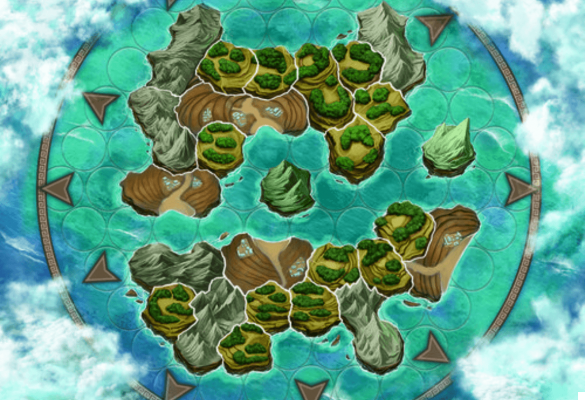
The glory of the monuments accompanies the Poleis | Cyclades Review: Monuments Expansion
In the case of this minor expansion, we honestly don't touch the peaks of the two big sisters for originality and gameplay. However, due to the very pleasant verticality that is added to an otherwise quite poor dashboard, Monuments also gives luster to the aesthetic aspect of Cyclades, completing its flowering at three hundred and sixty degrees.
The balancing deserves separate considerations, which in this case seems not entirely successful. Some monuments are clearly too impactful, compared to others that are truly situational. The relative ease of construction is also perplexing, but at least this way they will be there for most of the game. It is therefore necessary to draw up a balance sheet, and that of Monuments ticks it: it is positive. It is configured as a 'expansion suitable for those who have already widely enjoyed the game and need a power spike to accelerate even more a game that has no memory of the confused beginnings.
For the compulsive completists, there is also a micro expansion of Monuments, called Ancient Ruins, which doubles the number of monuments in play. Honestly, you don't feel the need, especially because it complicates an already intense game start, but if you want to call yourself true collectors, you can't let it go. You can buy it here.
A more I do not show | Cyclades review: the C3K expansion
We close this total review of Cyclades with the latest expansion, the so-called C3K. Thanks to it, it will be possible to fully add Kemet monsters to the Cyclades mythological creature deck (and vice versa); this proves how much Matagot is keen to make Inis, Kemet and Cyclades perceive as a trilogy. However, some doubts also arise here about the balance: Egyptian creatures are frankly very powerful, being able to move freely. This ability undermines the Cyclades dogma: if you want to move, you must be able to afford it. Situations in which we leave defenseless or semi-defenseless territories are not uncommon, aiming to control the movement skills of others. Frankly, the reverse operation was happier (the Greek creatures in Kemet are really interesting and a little more balanced).
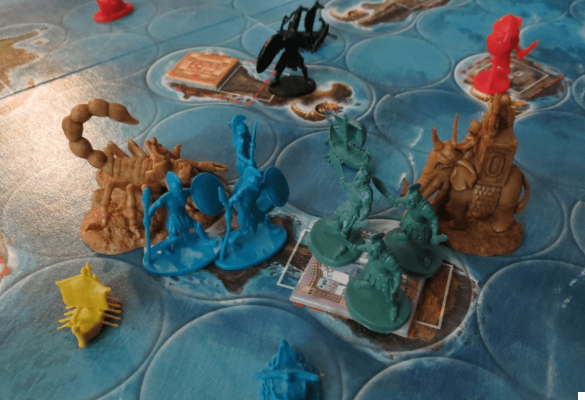
Finally, also for compulsive completists, a promotional package is also available that includes a monster card and a minor deity: the Manticore and Hecate. They are disconnected from everything else and can be inserted into any game, but they have very situational uses; if you are interested in collecting them, you can find them here with the typical Matagot velvet bags included.
Final considerations
We have examined the most important aspects and the result obtained is to have seen the metamorphosis of a game from hesitant territorial control to a grandiose combination of wargame, management, bluff / auctions and mythology. Even a minor expansion like Monuments makes its own, adding spice to the gameplay and above all color and quality to the mediocre base materials.
Your game is unique: it's Matagot
It sounds like an advertising slogan, yet it has literal meaning. Matagot stands out for itsvery interesting choice to make each copy of the game unique somehow: in this case with a nice detail, namely the color of the dice, which will be different in each box. This practice, then revived in subsequent titles such as Abyss, allows the French publisher to carve out a niche in the niche and makes Cyclades unique, as well as for originality and gameplay, also effectively.
Olympus is also digital
If you are really interested in exploring every island of the Cyclades, maybe there is an atoll you don't know yet: the Ipad version of Cyclades. Like Inis received a graphics upgrade and Kemet a 2.0 version, with Cyclades Matagot went digital. The application, which can be downloaded here for Apple tablets (unfortunately there are no alternatives for Android), is specifically designed for two players; I can only limit myself to reporting it to you though, since since I do not have an Ipad I could not test it. It can also be a good diversion from quarantine, if you have distant friends (Covid-19 quarantine, ed).
8.5 The greatest masterpiece of MatagotPoints in favor
- excellent expansions
- successfully mixes management and wargame elements
- auction mechanism among the best on the market
- felt setting
- game always open
Points against
- Lame base game with no expansions
- increasingly difficult to find
- cost of the individual boxes contained, but overall high




